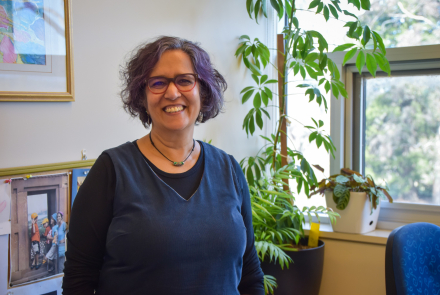
Professor Sango Mahanty navigates a year of achievements and ambitious research
Professor Sango Mahanty is having a busy year, to put it lightly. She has been appointed to the Australia-ASEAN Council, is a member of the Ministerial Advisory Committee on Industrial Chemicals and has been successful in the latest round of the Australian Research Council (ARC) Discovery Grants.
We sat down with Professor Mahanty to see how she juggles these responsibilities and what she hopes to uncover in her new research project.
Q: Can you tell us about the advisory groups that you work with?
I am on two Commonwealth advisory groups at the moment. The first is the relatively new Advisory Committee on the Environmental Management of Industrial Chemicals, which advises the Minister of Environment. In these first two years, the Committee has been advising on the scheduling of persistent organic pollutants that are listed under the Stockholm Convention. Australia has not yet ratified that convention, even though we are signatories to it. So, this process of scheduling high-risk chemicals is leading to Australia ratifying the Stockholm Convention.
The other one is the Australia-ASEAN Council, where I am on the board. The council geared towards building relationships in the region through education and cultural activities, and it has a small grants program to support this. As a member of the council’s board, I will be able to get a sense of what is going on in the region and contribute ideas. The secretariat is in the Department of Foreign Affairs and Trade (DFAT) and the council is an interesting body that brings together people from industry, educational institutions, and other sectors.
Q: What is your research background here at Crawford?
I am a human geographer who broadly looks at nature-society relationships, especially in the Mekong region. I’m part of the Resources, Environment and Development (READ) group here at Crawford. My latest research was looking at how people cope with hydropower and other environmental and social shifts in this region. I previously worked on forest governance and land use changes in Mekong landscapes.
Q: How does your work fit into the Advisory Committee on Environmental Management of Industrial Chemicals?
I was asked to be a part of this during a COVID-19 lockdown, and I am not a chemist by training, but they are taking an interdisciplinary approach to the way in which recommendations are considered and made. I have a social science and policy background, but quite a few people on the committee are scientists. We have really interesting discussions that allow for a broad range of issues to be fleshed out. It is often about how tight the restrictions are on certain chemicals, and in general, I think it’s a positive group to work with.
Q: Can you tell us about your latest ARC Discovery Grant project?
The project is titled Planet Chicken: Chemical Entanglements in Asia’s Poultry Boom. It will focus on the use of agricultural and other chemicals in livestock production, especially poultry. Specifically, it will look at chemical flows in poultry value chains in Asia, starting with the agricultural chemicals used to produce corn and soy to feed livestock. We will also look at chemicals in feed mills and around livestock, such as antibiotics, and the risk of anti-microbial resistance. From my social science perspective, I’m also interested in animal welfare and food safety aspects. There’s a really fantastic project team: Assa Doron from ANU, Rebecca Hamilton from Sydney and Thilde Bech-Bruun from Copenhagen, plus a deep network of collaborators from India, Thailand and Vietnam where we will work.
I previously worked on pollution, and my interest was reignited through my teaching – I developed a course for our master’s program on pollution and waste. My advisory committee work on chemicals came in around the same time.
Q: You recently stepped down as Research and Impact Director, Crawford School of Public Policy to give yourself more time to focus on your own work. How has the role impacted your research and grant applications?
I think certainly working with a range of applications and seeing them through the whole cycle has helped me hone my understanding of my own projects. But I also hope I have been able to share that knowledge back with other applicants in that role. ARC funding applications are quite a maze to navigate, and the more time you spend working on your own applications and helping others, the more you learn. Having skin in the game yourself, you can empathise with people also going through the process.
Each research director has their own strengths that they can bring to the process. For me, I was particularly interested helping people to apply for ARC funding, including DECRAs and Future Fellowships. They are challenging schemes to hit the mark on. A lot of support also comes from the College of Asia Pacific research office and others.
Associate Professor Long Chu will soon be taking over as the Research and Impact Director here at Crawford.
From all of us here at Crawford, we can’t wait to see what the next year will bring for you, Professor Mahanty. Congratulations on your latest appointments and ARC funding!
Updated: 27 July 2024/Responsible Officer: Crawford Engagement/Page Contact: CAP Web Team












